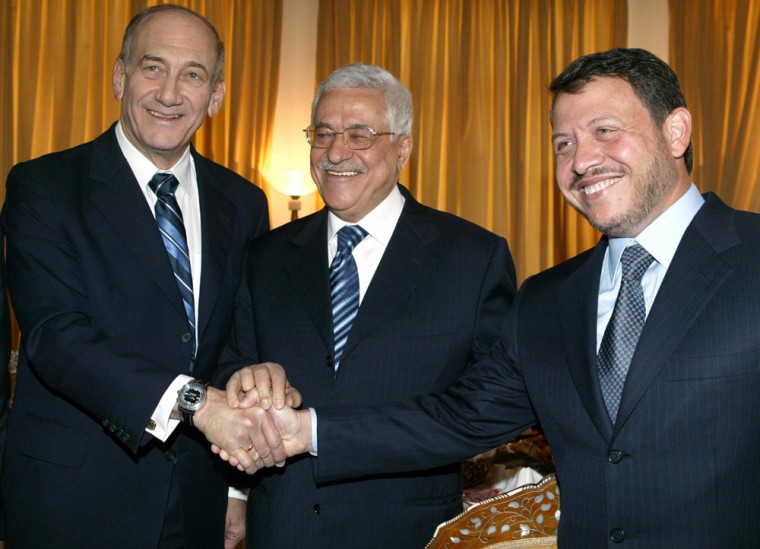Ehud Olmert and Mahmoud Abbas kissed and embraced Thursday in the first meeting between Israeli and Palestinian leaders in more than a year, and Olmert made a rare apology for Palestinian civilian deaths in recent Israeli airstrikes.
Despite the icebreaker, the Israeli prime minister said peace talks are unlikely unless the Palestinians’ Hamas-led government changes its stripes, and he pledged to keep up attacks against militants.
Thirteen Palestinian civilians have been killed in Israeli airstrikes in the past week, including two slain by an errant missile Wednesday at a house in Gaza.
“It is against our policy and I am very, very sorry,” Olmert said after a breakfast meeting with the Palestinian president in the ancient town of Petra hosted by Jordan’s King Abdullah II. He reiterated the apology “from the depths of my being” when he spoke Thursday evening in Jerusalem after returning from Jordan.
Olmert did not mention a June 9 beach explosion that killed eight Palestinian civilians. Palestinians blame Israel, but Israel has denied responsibility. The Israeli airstrikes came in response to rocket attacks by Palestininan militants in the Gaza Strip.
“Israel will continue to carry out targeted attacks against terrorists and those who try to harm Israeli citizens,” Olmert said in Jerusalem.
Successful meeting
The Jordanians saw the Abbas-Olmert meeting as an effort to warm relations between Israel and the Palestinians, and the encounter seemed to produce the desired effect: The two men shook hands, embraced and kissed each other on the cheek and both sides promised a more substantive meeting in coming weeks.
Asked about his handshake with Olmert, Abbas said, “It was very warm, very warm.” And Olmert had only warm words in return for Abbas.
“I think that Abu Mazen is a genuine person and he comes here with good intentions,” Olmert said after the meeting, using the Palestinian president’s nickname. “But to the best of my knowledge, he is not the prime minister of the Palestinian Authority.”
The prime minister, Ismail Haniyeh, belongs to militant Islamic Hamas, which rejects Israel’s right to exist, has sent dozens of suicide bombers into Israel and refuses to renounce violence.
In Jerusalem, Olmert ruled out negotiations with Hamas, which he said “leans on terror.”
Abbas, a moderate elected separately last year, is in an intense power struggle with Hamas, and is trying to persuade Israel to bypass the militant group and negotiate peace directly with him.
Though Israel doubts his ability to deliver a final peace deal, Olmert agreed under international pressure to meet with Abbas and try to get long-stalled peace talks back on track.
Should that fail, he plans to unilaterally withdraw from large chunks of the West Bank, but not all of the territory, as the Palestinians want Israel to do.
Abbas has been seeking to persuade Hamas to accept a proposal for a Palestinian state alongside Israel. Its acceptance would be an implicit recognition of Israel which could help restart peace talks and provide a way out of a crippling world aid boycott imposed since Hamas took over the Palestinian government.
Abbas said he hoped his dialogue with Hamas would “reach a positive outcome ... so the world can interact with us and end its siege.”
Referendum possible if Hamas refuses
If Hamas continues to reject the proposal, Abbas plans to bring the plan to Palestinian voters in a July 26 referendum.
The Abbas-Olmert meeting took place on the sidelines of a two-day gathering of Nobel Prize winners in Jordan. Olmert, Abbas and Abdullah sat at a table with the Dalai Lama and Elie Weisel, a Holocaust survivor and author.
The last meeting between Israeli and Palestinian leaders was Feb. 8, 2005, when then-Prime Minister Ariel Sharon met with Abbas in Egypt and announced a cease-fire.
On Thursday, after returning to the West Bank city of Ramallah, Abbas said he and Olmert had discussed one point — how to prepare for a forthcoming meeting. Officials on both sides said that meeting would take place in several weeks.
A Hamas lawmaker and spokesman, Mushir al-Masri, said his group was not optimistic about future negotiations between Olmert and Abbas.
“Experience has proven that such meetings can’t bring anything to our people,” he said.
In violence late Thursday, Israeli forces killed a Palestinian militant during a raid in Ramallah, security officials said. The military said soldiers returned Palestinian fire during the operation, hitting a militant.
